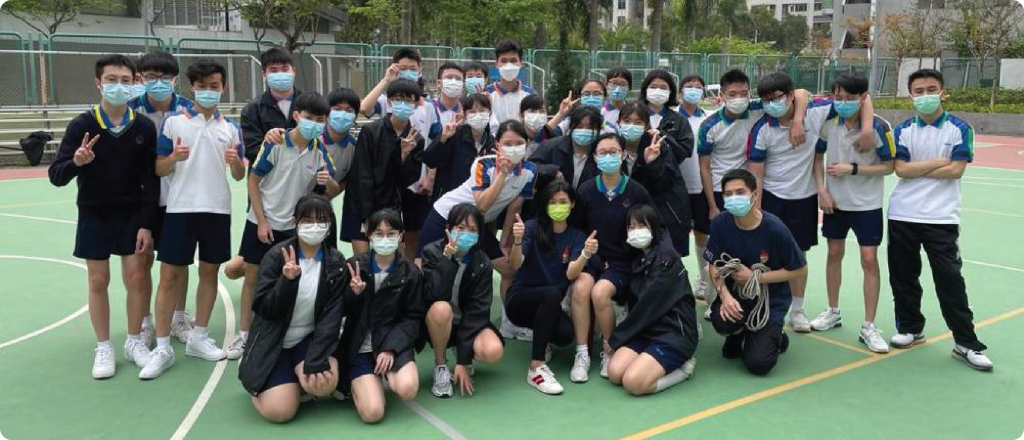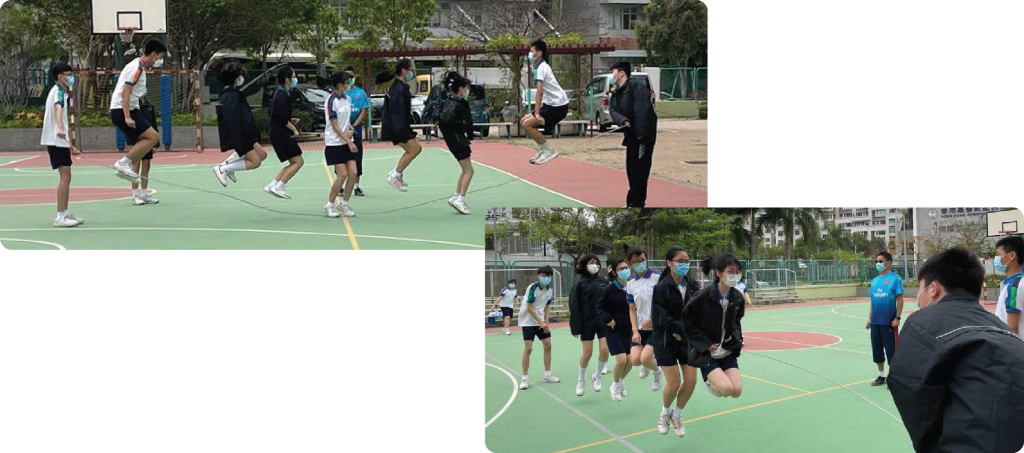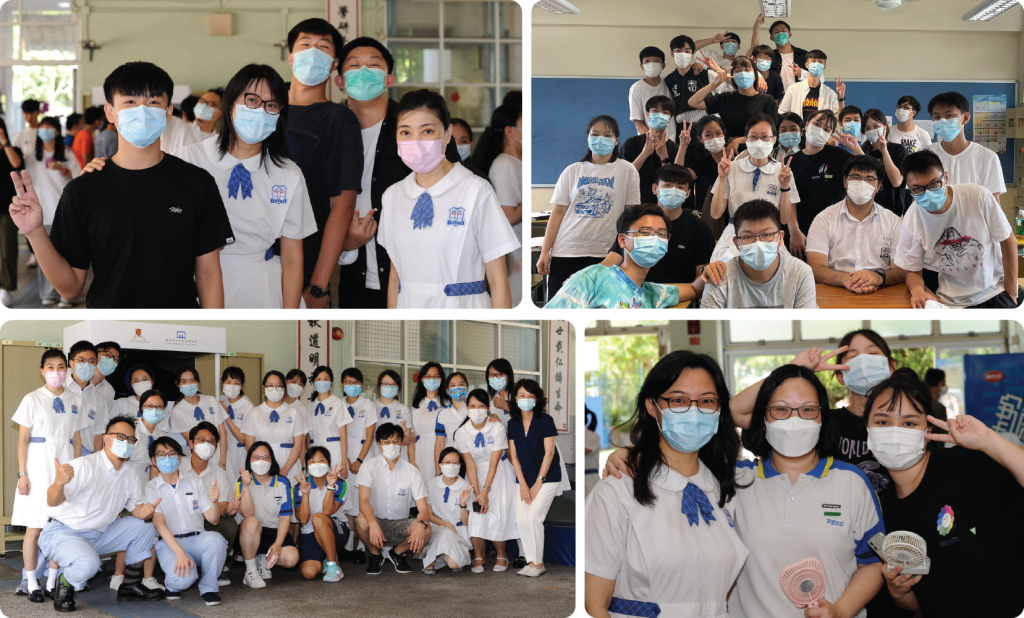Participating school sharing
Class management under the epidemic
Background of the initiative
NLSI Peace Evangelical Secondary School has a history of more than 20 years in Tuen Mun District, and parents and people in the district consider us to be a school with a liberal and caring culture.
In the 2019-2020 school year, due to the COVID-19 epidemic, students had lessons in online classes and did not have campus life – the most valuable part of their school life. The interaction between students, the care and mutual trust between teachers and students are the essential elements of campus life. In particular, students who have just been promoted to S1 and S4 need special attention. The school was aware of this situation and have added class management to the school's concerns in the 2020-2021 annual school plan, expecting the class teachers to enhance the cohesion of the class through various means to help students cope with the mental problems caused by the virus outbreak. Classes were encouraged to carry out class association activities. Class teachers were also required to collect student weekly journals regularly so that the class teacher could better understand their students.
Three class teachers for each S1 class
The school arranged three class teachers for each S1 class to provide more comprehensive care for them. During the summer holidays, the school offered bridging courses for S1 newcomers. The school also arranged for the three class teachers of each class to meet with their parents. This helped the school better understand the new students and let the Discipline and Guidance team better prepare for their work in the upcoming school year.
Class activities after resumption of in-class lessons
Shortly after the beginning of the school year, the Education Department announced the suspension of in-class lessons and on-campus activities in response to the worsening situation of the COVID-19 epidemic. How could we carry out class management without face-to-face classes and students being unable to go back to school? How do we build relationships with students without meeting each other in-person? I believe this is the biggest challenge for all of us.
As time went by, the school saw that the epidemic had subsided. Our school has complied with the EDB's latest policy and resumed in-class lessons in the afternoons. Not only did this allow us to speed up our delayed teaching progress, but it also allowed students to have the opportunity to re-establish relations with each other. In addition to academic subjects, the school also arranged some practical subjects like music, visual arts, home economics, and D&T in the afternoon. At the same time, we also arranged Physical Education lessons, as the school noticed students’ lack of contact with people and walking around for nearly a year of online classes. The school believed that through the relatively relaxed practical lessons, it is easier for students to re-establish a positive mindset, communicate more with each other, and re-establish their relationship.
The school has also learnt that S6 students have been under significant pressure during the suspension of in-class lessons as DSE was ahead. We then designed special PE lessons for S6 students, aiming to reduce their stress. The PE teacher attended these lessons, the class teacher, part of the teachers teaching S6, and the students. In the lesson, we arranged stretching exercises and group games for teachers and students. Through group games, we were able to build greater bonding among students in the same class. We have learnt from class teachers that the session has achieved the result we desired.
Since we resumed face-to-face lessons in the afternoon, our teacher team have been creative and seized opportunities to enhance the cohesion of all classes. When S4 classes resumed in-class lessons, the class teachers of 4D have referenced the approach of S6 and proposed to host a jump rope competition in the PE lesson. During preparation, the form teacher inquired if the class could spend a PE lesson for a class association activity, and the school was pleased to accept the suggestion.
The class teachers have made some hard work in grouping students in the preparatory process: how could active students drive quieter students to participate together? How could the competition be organised to make the whole class enjoy it more? The two class teachers have also invited the PE teacher to provide assistance, e.g., preparing long ropes and joining one group when the whole class is divided into three groups. The teachers thought about every detail, hoping to make the game run as smooth as possible.

In the beginning, students didn’t engage much during the competition, as they were not familiar with each other due to their lack of contact cause by the epidemic. The atmosphere got better as class teachers and the PE teacher practised with the students. As long as the teachers were willing to participate with students, students felt that the teachers were also part of the class and became more willing to try. Some students with leadership skills also took the leadership role and encouraged some other students, even the quieter students, to formulate strategies to win the game.
At the beginning of the actual match, everyone was in high spirits and hoped that their group would win. They cheered each other and yelled, 'Miss Wong, keep fighting!' 'Mr Leung is so strong!'. Everyone had participated in class 4D. After the game, everyone was still indulging in the joy of the game and took photos together. They made fun of and communicated with each other. The cohesion of the class had improved a lot.
This jump rope competition took the group game of S6 to the next level. Since this is a competition, students could strengthen their team spirit and encourage each other. The activity also closed the distance between each student and their class teacher.

Other activities
In addition to these class activities, the school also organised a 'casual wear day', which allowed students who performed well in online classes to dress in casual wear on certain days. Teachers would wear student uniforms, which made the campus full of laughter. In May, the school held classroom cleaning activities through cleaning classrooms together to enhance awareness of combating the epidemic. As the epidemic gradually subsided in May, the school organised a school picnic and arranged for students to go to the Ocean Park, including participating in wilderness adventures, like hiking and so on. It aimed to allow students to express the emotions accumulated during class suspension, enhance their sense of belonging to the school, and enjoy campus life more.

Conclusion
To conclude our experience over the past year, we find that if we can provide teachers with enough room and clear goals, our colleagues can use their unlimited creativity to meet the school's expectations. We can recognise and show our appreciation to our colleagues by letting them share their ideas with colleagues. It inspired other class teachers and benefitted students.
Sharing from other schools (2020/21)
Sharing from other schools (2021/22)
S.K.H. Chu Yan Primary School
S.K.H. Holy Carpenter Primary School
S.K.H. Yuen Chen Maun Chen Jubilee Primary School
Sam Shui Natives Association Huen King Wing School
Shanghai Alumni Primary School
Shun Lee Catholic Secondary School
Tai Kok Tsui Catholic Primary School
Yan Chai Hospital Choi Hin To Primary School
